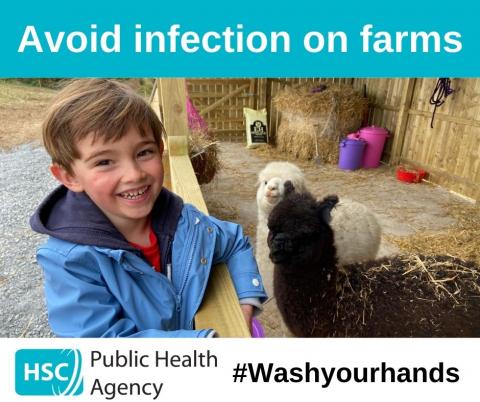PHA offers advice on avoiding infection on farms

Visiting a farm is an enjoyable and educational experience for many people, particularly children. However, visiting a farm carries a small risk of catching infection from animals or the environment.
As restrictions begin to ease and the weather improves the Public Health Agency (PHA) is reminding people of simple steps they can take to keep safe and well.
Dr Philip Veal, Consultant in Heath Protection, said: “Farm animals can be the source of several bugs that can be passed from animals to humans and cause illness. Some can be particularly serious for children or pregnant women.
“All animals naturally carry a range of organisms, some of which can be transmitted to children and adults and can potentially cause severe infection, particularly in young children and pregnant women. For example, E. coli O157 is easily passed from animals to children, can spread easily within the household and may cause severe infection in young children.
“Cryptosporidium is another organism which causes an infection of the gastrointestinal tract. Symptoms include vomiting, abdominal cramps and watery diarrhoea. Cryptosporidium is a leading cause of infectious diarrhoea in humans in the UK and can occur through contaminated recreational waters, including swimming pools.
“These bugs may not cause animals to be visibly ill so it’s difficult to tell whether an animal is infected, especially when they look clean and healthy. Infection can be picked up from the animal’s body, its poo or from areas where animals have recently been. If the bugs are on your hands, you could accidentally pass them to your mouth.”
- Wash hands thoroughly using soap and water after handling animals or touching surfaces at the farm;
- Do not kiss farm animals or allow children to put their faces close to animals;
- Hands should always be washed before eating or drinking and after using the toilet;
- Antibacterial hand gels and wipes are not a substitute for washing hands, as gels and wipes may not adequately remove germs and bugs in the way that running water can. However, using such gels after hand washing with soap and water may reduce the risk of picking up these infections.
- Remove and clean boots or shoes that might have become soiled and clean pushchair wheels. Then wash your hands thoroughly with soap and water.
“A responsible adult should always supervise children’s personal hygiene to make sure it is carried out properly. If you or anyone in your group feels unwell or has any symptoms, for example is sick or has diarrhoea within 2 weeks of visiting a farm, contact your GP. By being aware and by taking some simple steps, we can all help to avoid illness,” concluded Dr Veal.
For further advice see www.visitmyfarm.org
